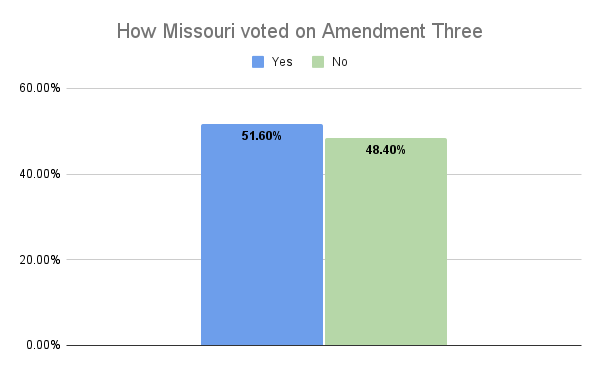Roe v. Wade was a Supreme Court ruling from 1973. It guaranteed women’s right to abortion based on the Fourteenth Amendment’s Due Process Clause. On June 24, 2022 the Supreme Court overruled Roe v. Wade on the condition that abortion is not rooted in the nation’s history and was not considered a right in 1868 when the Due Process Clause was ratified. This lead to Missouri’s current situation with Amendment Three.
Missouri instituted a trigger law in 2019 so that in the case of Roe v. Wade being overturned, a full abortion ban would go into place. By doing this, Missouri became one of 13 states to ban abortion with trigger laws. Residents of Missouri did not get to vote on the trigger law, so people living in Missouri didn’t have a say in the initial abortion ban.

Last November, Amendment Three was on the Missouri ballot. The amendment was rallying to add a provision to the Missouri constitution that protects reproductive freedom in the state. The reform passed, with 51.6 percent of voters wanting to ratify the amendment. Even though the population voted Amendment Three into law, it has not taken effect yet. Numerous people in the state, including the Attorney General of Missouri, Andrew Bailey, are trying to block it with lawsuits. Resulting in the amendment not taking full effect immediately.
Days after the amendment was passed, Planned Parenthood and the American Civil Liberties Union (ACLU) filed a lawsuit in an attempt to strike down preexisting abortion ban related legislation. This is why the amendment has not been ratified yet.
Mike Kehoe held an unprecedented special session of Congress on Sept. 8. In this session, lawmakers passed a proposal to manipulate the boundaries of congressional districts in Missouri. This can make it more difficult for voters to pass amendments in the state. Thousands of Missouri residents protested the proposal in the capital building.






